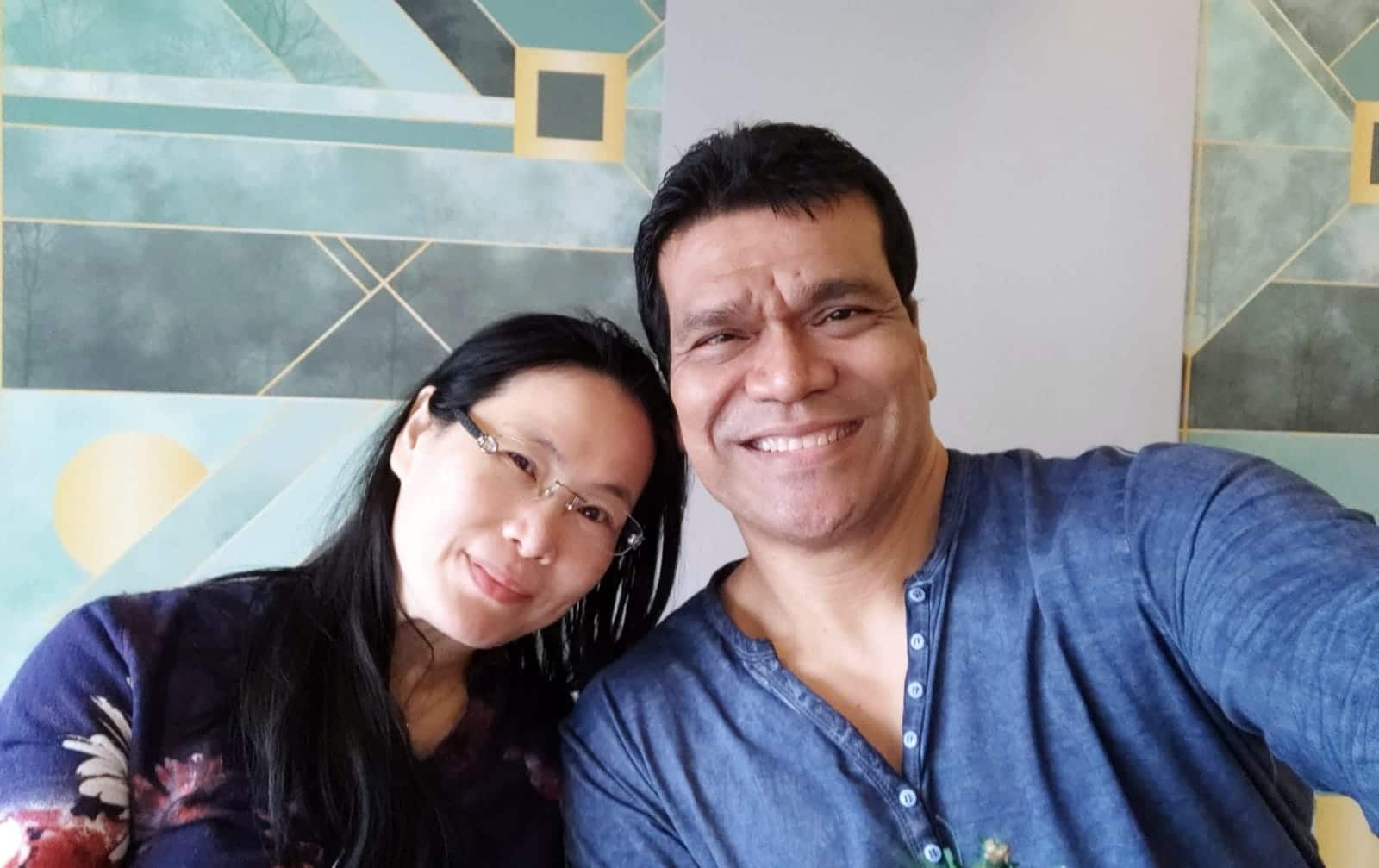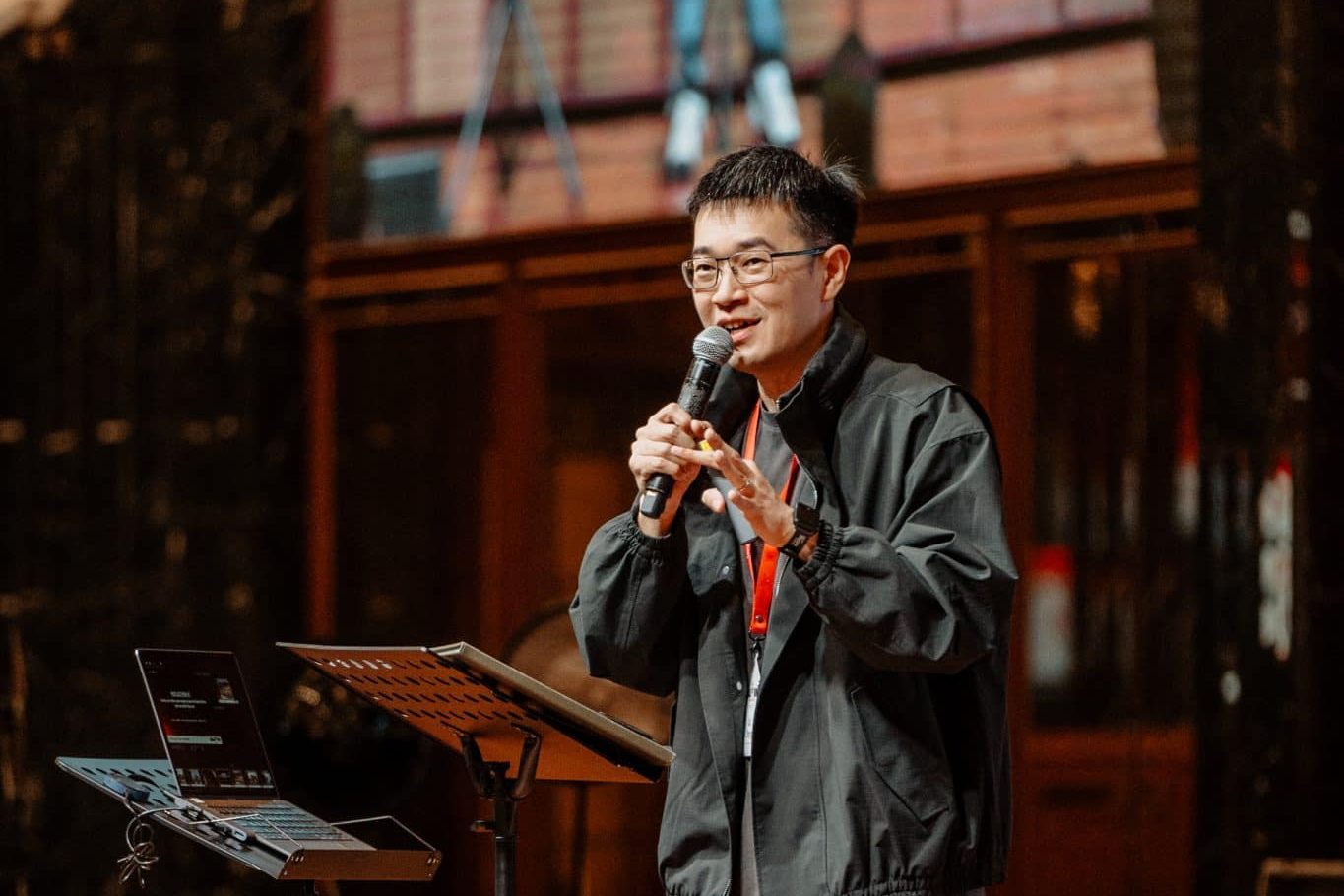Dance classes, jogging sessions are ways COOS shows Queenstown neighbours “the lovely part of the faith”
by Gemma Koh // February 24, 2023, 5:50 pm
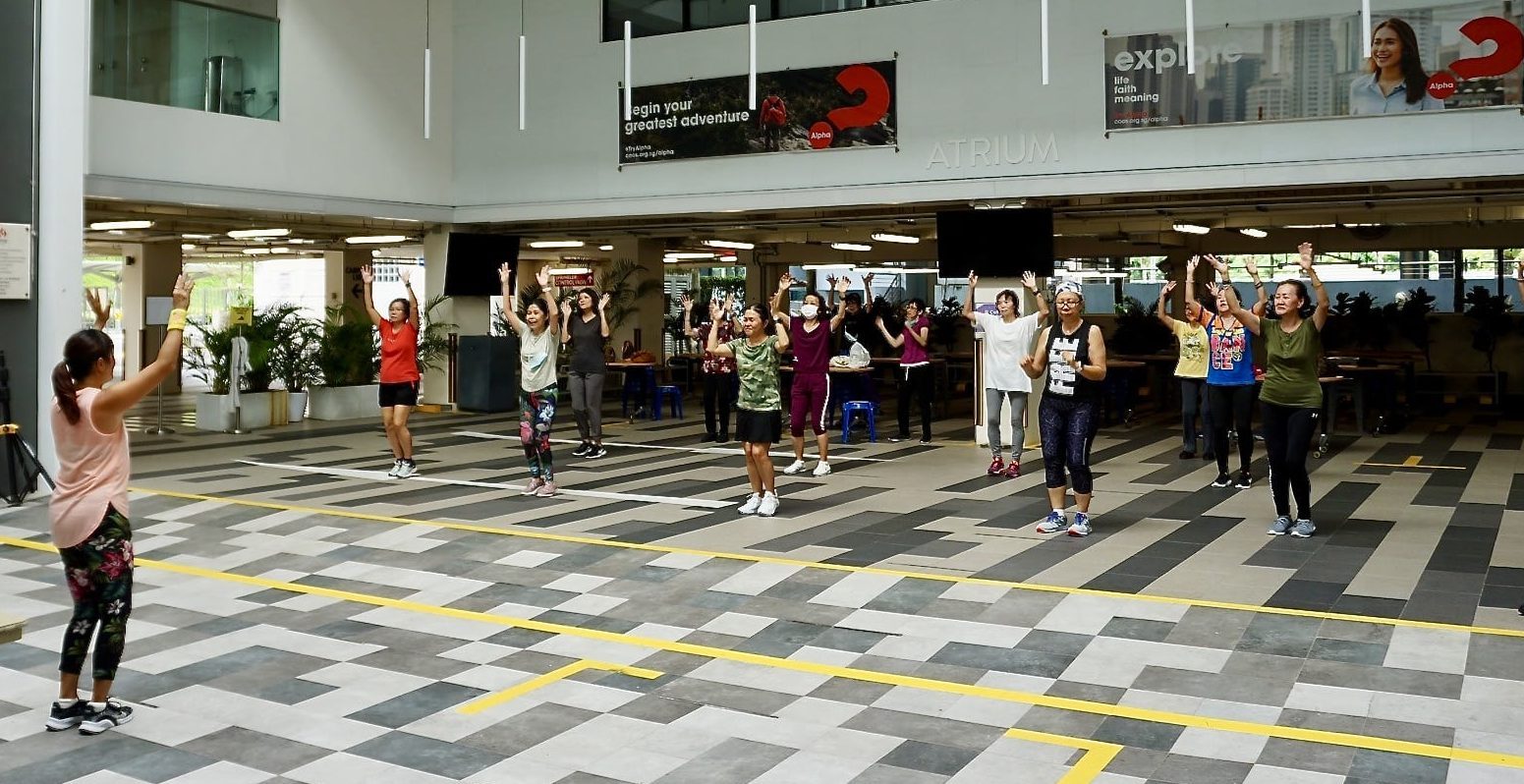
A Zumba session at the atrium of Church of Our Saviour. It is one way the church befriends and loves neighbours, said its Senior Pastor, Daniel Wee. All photos courtesy of COOS unless otherwise stated.
A young pastor who is a fitness enthusiast wakes up at 6am to go jogging at the nearby stadium.
He starts talking with the “aunties” there, and soon becomes their unofficial jogging coach.
“Wait. Don’t go yet. Must ask the coach to pray for us first.”
With their permission, he also prays for them at the end of each session.
Over time, he notices the aunties, who are of a different faith, tell newcomers: “Wait. Don’t go yet. Must ask the coach to pray for us first.”
Joked Ps Daniel Wee, Senior Pastor of Church of Our Saviour (COOS), during the Pastors’ Summits in both 2023 and in 2021: “The aunties became Christians by osmosis!”
It is one of many fresh ways members and staff at COOS love and befriend neighbours living in HDB flats in the Queenstown area.
“When you build relationships, over time many of these people automatically start coming to church.
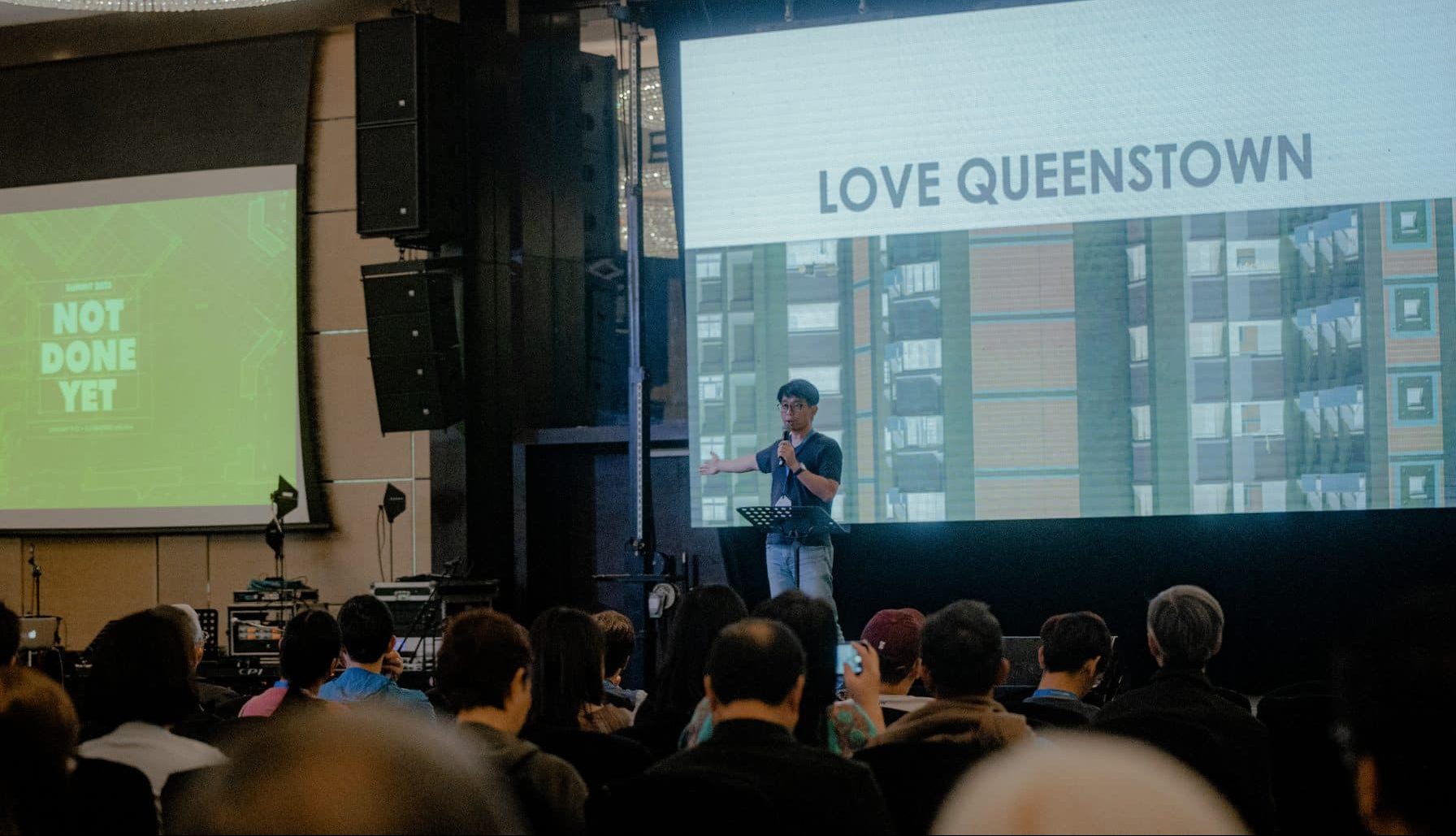
Ps Daniel Wee speaking at Pastors’ Summit 2023.
“So we celebrate this. Often the fruit surprises. Every week, there are people getting saved,” he said.
Building relationships
“Some people have the misconception that evangelism looks like a giant rally with people rushing to the altar,” said Ps Daniel.
“Overzealous efforts to share the faith is like asking ‘Will you marry me?’ before the first date is over.”
“No wonder evangelism is the one thing that both Christians and non-Christians are terrified of.
“Many Christians are terrified of talking to strangers. And non-Christians are saying, ‘Please don’t come here.’
“This is not only daunting for the community, but discouraging for church members who get more rejections than acceptance through methods like making cold calls and handing out tracts.
“Overzealous efforts to share the faith is like asking ‘Will you marry me?’ before the first date is over.”
Instead, Ps Daniel urges his congregants to show others “the lovely part, instead of the terrifying part, of the faith”.
This means building relationships with the community.
It also means making evangelism doable for church members.
“If the carrot is too high, you won’t bother jumping for it. But if it looks like you need to make a bit of effort to reach the carrot, it is actually doable,” he said.
Below, Ps Daniel shares six handles from COOS’ experience.
He acknowledges that many ideas COOS adopts have been adapted from other churches. And they may not work for every church. But they are a jumping-off point for thinking about how you can adapt them for your particular neighbourhood and church.
1. Break down the cultural barrier
Ps Daniel notices that Christians in Singapore may be “disproportionately university-educated, upper middle class and jiak kantang (Westernised)”.
“A lot of evangelistic approaches cater to this group of people. We are all fishing from the same pool that is saturated.
“The barrier to many non-believers coming to Christ is more cultural and social, not intellectual or theological.”
“I’ve never had a taxi driver or an ‘uncle’ or ‘aunty’ say to me, ‘I do not believe in the doctrine of the trinity.’
“Instead, we hear concerns like, ‘I want to get baptised, but who will make offerings to my mum who is of another faith when she dies?’ Or, ‘My late husband was not a believer. If I become a Christian, I’m scared that no one will accompany him in the afterlife.’
“The barrier to their coming to Christ is more cultural and social, not intellectual or theological.
“None of them have an intellectual problem with God. So, cognitive messaging and giving them books to read is not going to work.
“But they respond to kindness, love, honesty and friendship.”
Ps Daniel has also noticed that “most people don’t have an objection to becoming Christian. Their problem is rarely with Christ. It has more to do with bad experiences with Christians.
“If you can take the long road and become kinder, nicer, more gracious, loving people, evangelism is quite easy.”
2. Make it socially fun
“In outreach, it’s important to think about what you are trying to do rather than blindly parroting some method that we learnt a long time ago,” said Ps Daniel.
He gave the example of being taught to ask non-believers: “Do you know that you are a sinner? Without Christ, you will go to a Christ-less eternity.”
Some methods may work for certain groups of people, he said. But if you are thinking of reaching the greater population, you need to ask yourself: Why is this not working?
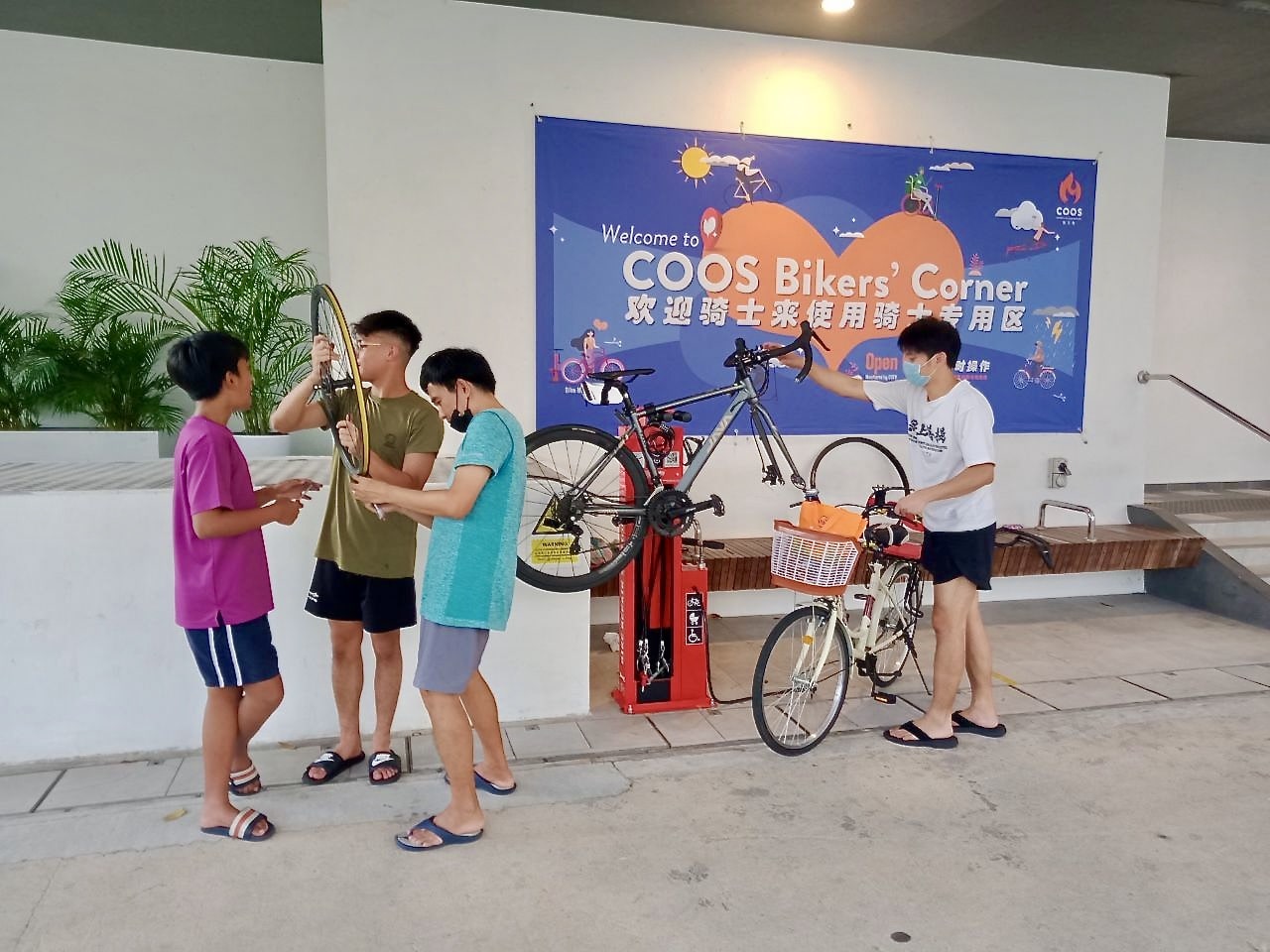
COOS installed a bicycle servicing station on its premises to serve resident cyclists as well as those using the nearby Park Connector Network (PCN).
“Creativity and boldness are required to find new ways to reach the hearts of residents around us. Don’t be afraid to try something different,” he said.
When COOS rebuilt the church, for example, they did not erect a fence.
“This is deliberate because we want people to step in very often until they don’t feel weird,” Ps Daniel explained.
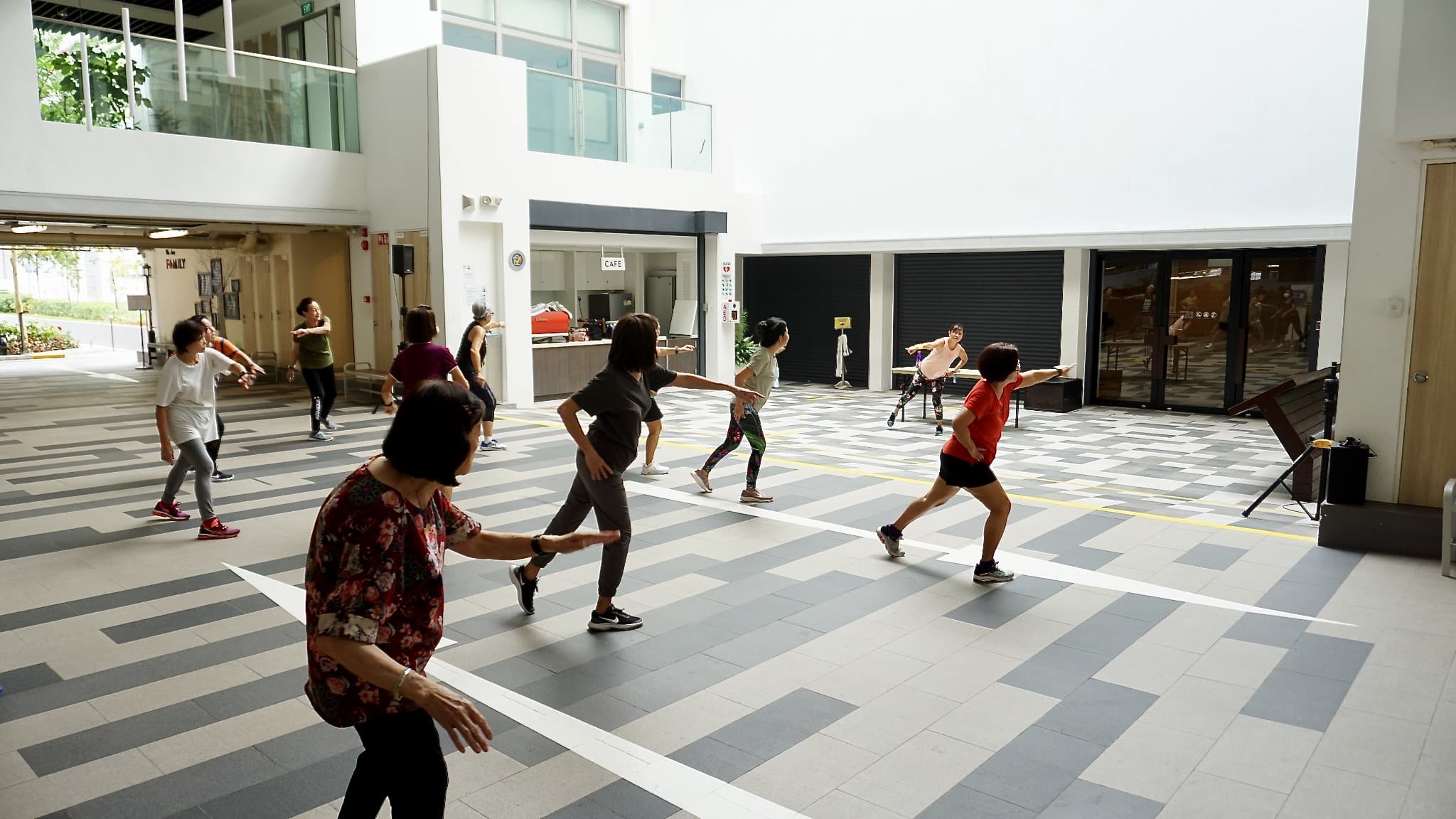
The COOS atrium is a pedestrian thoroughfare between Commonwealth Avenue and Margaret Drive. Many using it end up joining free activities like this low-impact version of Zumba. On Tuesdays and Wednesdays from 3-5pm, all are welcome to the cafe in the atrium for free beverages, snacks and a friendly chat.
Ps Daniel also pointed out: “A lot of people in the neighbourhood don’t come to church because they don’t know anyone.
“And when they come and hear people speaking English, they feel very small and out of place.”
The church tries to overcome such barriers through activities, such as dance classes, it holds on the church premises.
Ps Daniel was pleasantly surprised when he overheard a non-Christian auntie invite someone to the dance class, saying, “Come to my church, lah.”
3. Project the presence of the church
When Ps Daniel first started his attempts to reach out to residents living near COOS, he encountered some who did not know where the church was, despite living across the road to it for close to a decade.
“If people don’t know where your church is, they can’t come to you.”
To raise awareness, COOS ensures that the church name is on the t-shirts that volunteers wear during outreach efforts to surrounding flats – and also on the gifts distributed.
(Side note: Good gifts are practical ones – such as towels and umbrellas – that will be kept and used, and not items like magnets that tend to be thrown away.)
While Ps Daniel warns against “shoving the Gospel down people’s throats”, he also warns church volunteers and workers against being “too covert” (that is, by not identifying that they are from a church) when distributing gifts to neighbours.
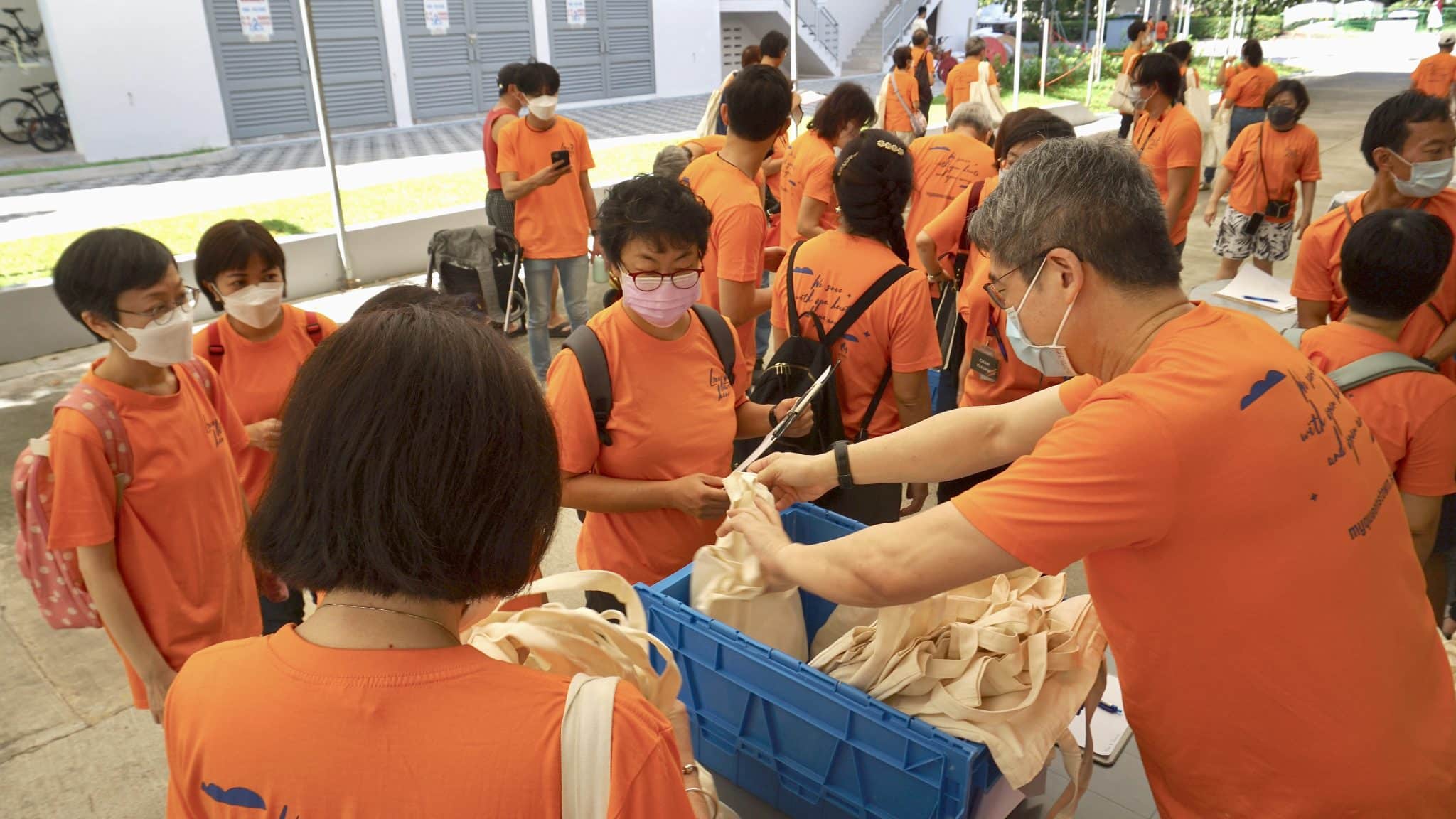
COOS members picking up goodie bags to welcome neighbours who have moved into brand new HDB flats in Dawson Road. More than 200 church members were involved in distributing almost 1,000 welcome bags.
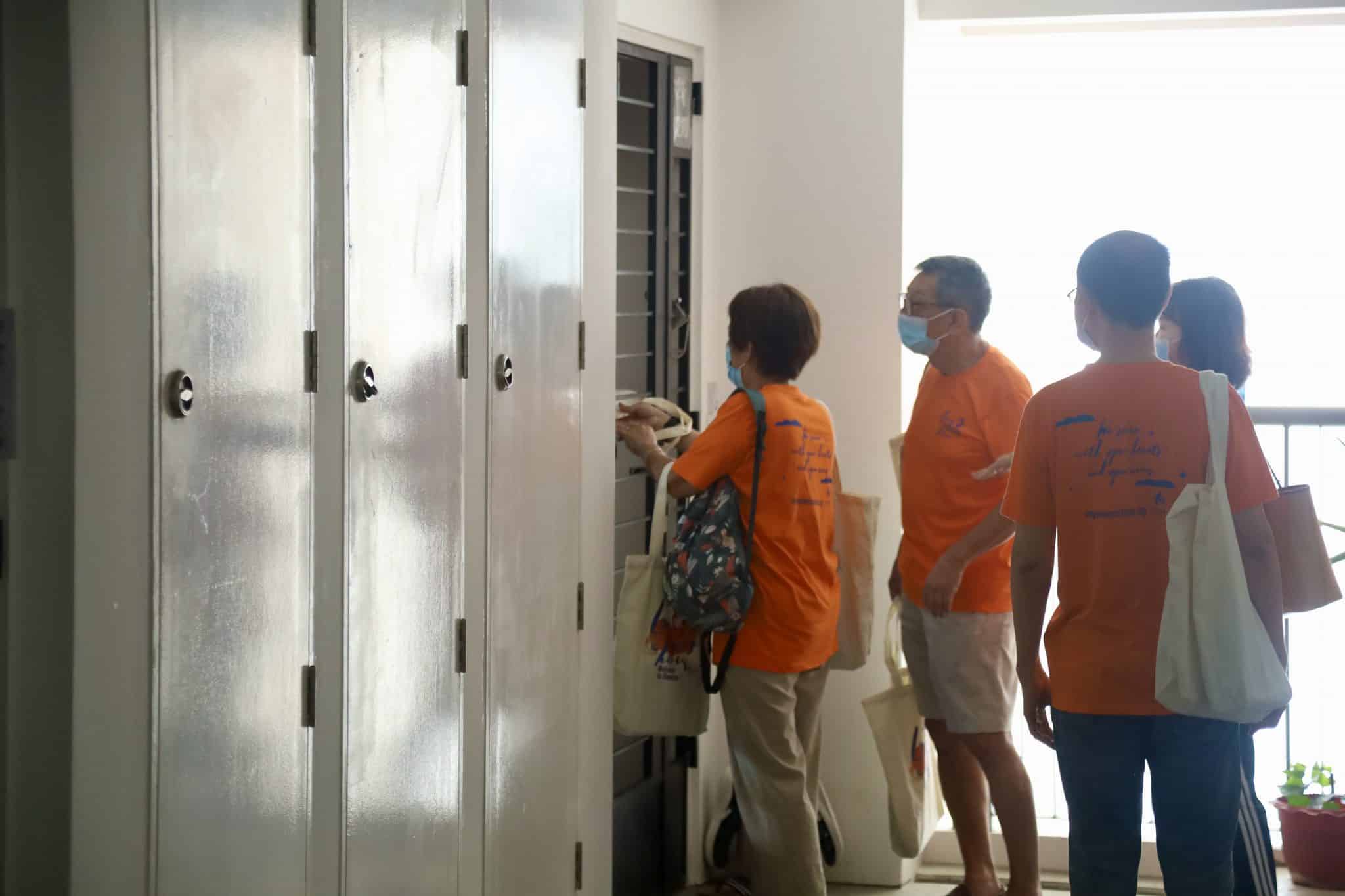
Welcoming new neighbours to the Queenstown neighbourhood.
“You cannot be apologetic or ashamed about being from the church.
“If people don’t know where your church is, they can’t come to you,” he said.
4. Go for the marathon, not the sprint
Reaching out to residents in neighbouring blocks requires effort over various occasions and over time. Otherwise it is akin someone standing for election who only visits your home during voting season, said Ps Daniel.
“Relationships are not built overnight.
“It won’t work if you only show up twice a year over Christmas and Easter,” said Ps Daniel, who likens community outreach to a marathon, not a sprint.
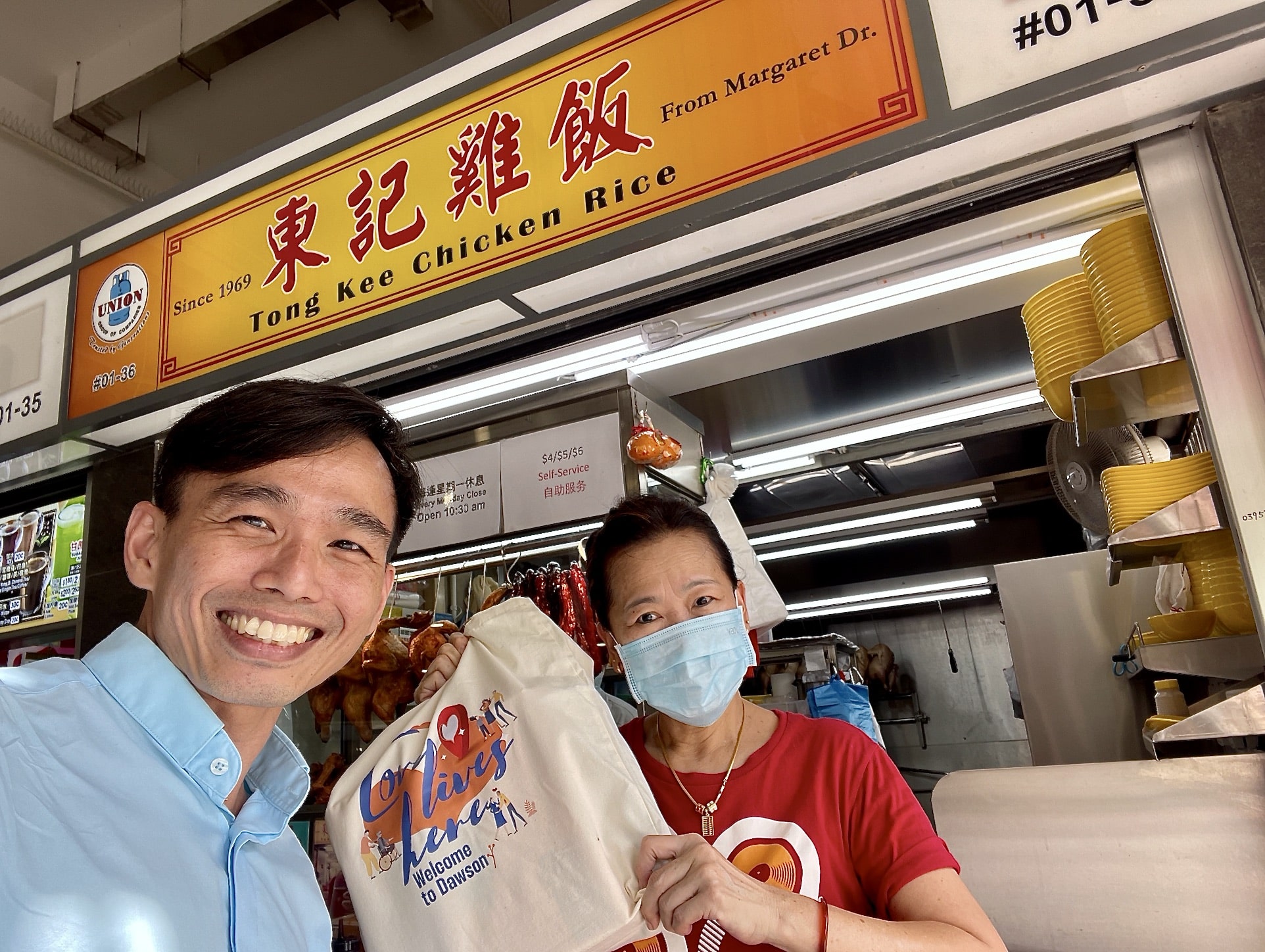
Early this year, COOS Associate Vicar, Rev Christopher Ho, and staff (not pictured) showed their appreciation to hawkers at Margaret Drive Food Centre by gifting them with blessing bags of Chinese New Year goodies.
“You must figure out how to make your presence felt and to project your presence in a meaningful way. Consistency counts.”
COOS tries to do this “by being very present”.
“When the residents need help, you want them to think of you,” said Ps Daniel.
He shared that recently, the church got a call from a neighbour whose husband had a stroke.
“She didn’t know who to call, so she called the church,” he said.
A team from the church helped take the family to visit the man in hospital, and connected them with the relevant aid agencies.
The next day, the whole family accepted Christ.
5. Partnerships work
Reaching out and serving the community opens up opportunities to collaborate in various ways with the Residents’ Committee, schools and businesses in the neighbourhood.
“We think about how we can invest in our friendship with our neighbours through events and supporting their businesses,” said Ps Daniel.
“The Kingdom of God is non-territorial.”
In November, the church hosted a career skills development talk with career coaches from Avodah People Solutions, to benefit Dawson neighbours and COOS members.
In August, COOS joined forces with neighbouring Church of the Good Shepherd to organise a cycling event to raise funds for another neighbour, special education school Rainbow Centre.
COOS also collaborates with other churches in the neighbourhood. In one outreach project, for instance, a booklet containing the information and programmes of the churches in the area was printed and disseminated to the residents.
“We have the mindset that the Kingdom of God is non-territorial.
“It doesn’t matter which church the residents end up going to. As long as they go, we all win.”

Ps Daniel Wee (second from left) with four other pastors from the Queenstown neighbourhood (from left to right): Wilson Teo (Grace AG), Isaac Teng (Queenstown Baptist Church), Jonathan Wong (Church of the Good Shepherd) and Lee Kien Seng (True Way Presbyterian Church).
COOS also avails their premises to other churches when it is not being used.
“It doesn’t matter which church the residents end up going to. As long as they go, we all win.”
It makes the church look “happening”, instead of resembling a “haunted house”, during the week and stirs up curiosity to visit, quips Ps Daniel.
COOS also collaborates with other churches beyond Queenstown.
“Our church members stay all over Singapore and they are getting old. We don’t have enough money to pay enough staff to look after all of them. But maybe they are in the backyard of another church.
“You can do a trade: You look after my people in your backyard, I look after your people in my backyard. This kind of trade is very necessary as the nation ages more and more.”
6. Freeing up resources to love
Building a relationship with others is something that takes love, time, effort and resources.
Ps Daniel puts an emphasis on “trying to focus on a few things rather than many things”.
As it is, many church members already have multiple commitments such as Bible study and rehearsals for those serving on the worship team.
“Doing too much is a sure formula to burn people out. Doing more things doesn’t make you more spiritual,” he said.
“If they cannot bring a lamb or an ox, they can bring two turtledoves or a handful of flour.”
“Leaders can create space for community outreach by chopping off – slowly and respectfully – programmes at church that take up a lot of resources, time and energy that don’t bear much fruit.”
For example, he said: “Why do I need to reinvent the wheel, spend a lot of manpower to write up material for Bible studies which will probably not end up as good as the ones you can buy off the shelf?”
He shared that COOS has also “decentralised many of its ministries” so that church members own and pay for their own ministries “instead of the church paying for every ministry and being bottlenecked by how much staff and money they have”.
“My job is not to control. We are structured to empower.
“Let everyone scale their outreach efforts to their size and ability.
“If they cannot bring a lamb or an ox, they can bring two turtledoves or a handful of flour. And if there are seasons they don’t want to, there is no guilt.”
Ps Daniel also reminded that “God will provide for His own business, especially if you exercise faith”.
RELATED STORIES:
We are an independent, non-profit organisation that relies on the generosity of our readers, such as yourself, to continue serving the kingdom. Every dollar donated goes directly back into our editorial coverage.
Would you consider partnering with us in our kingdom work by supporting us financially, either as a one-off donation, or a recurring pledge?
Support Salt&Light